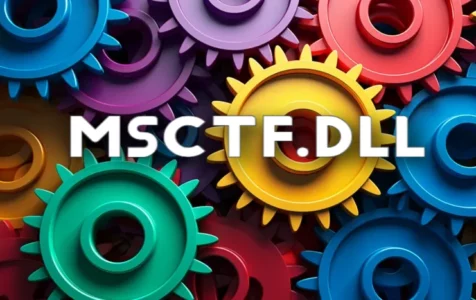If you’ve stumbled across a file on your computer named msctf.dll and wondered what it is, you’re not alone. This file raises many questions among users: What does it do? Is it safe? Could it be a virus? Let’s allay those concerns and discuss everything you need to know about the msctf.dll file.
Msctf.dll File Background
Primarily, msctf.dll is a file associated with the Microsoft Text Services Framework (TSF). Developed by Microsoft, the file sits within the Windows operating system, typically located at “C:\Windows\System32.” It plays a crucial role in handling language and input services. For people using multiple languages or advanced text services like voice recognition, the msctf.dll file is quite important.
When you switch languages on the fly or use features involving text services within third-party applications, msctf.dll is hard at work. It helps initialize the Language Bar GUI, enabling users to choose new languages or avail of input functions like keyboard, speech, or handwriting recognition.
On 64-bit versions of Windows, a 32-bit version of msctf.dll is also available in the “C:\Windows\SysWOW64” directory to support 32-bit applications running on a 64-bit system.
Expert Tip: For smoother PC performance, consider using a PC optimization tool. It handles junk files, incorrect settings, and harmful apps. Make sure it's right for your system, and always check the EULA and Privacy Policy.
Special offer. About Outbyte, uninstall instructions, EULA, Privacy Policy.
Is Msctf.dll Safe, or Could It Be Malware?
In principle, msctf.dll is a safe and legitimate Windows file, digitally signed by Microsoft. However, there are instances where malicious programs may disguise themselves as legitimate files like msctf.dll, especially if they’re located outside of the System32 folder. If you have any doubts about the file, its properties can be inspected, and any anomalies should be investigated with a reliable security or anti-malware program.
Msctf.dll Errors and Solutions
Various issues can arise relating to msctf.dll, such as errors indicating the file is missing, corrupted, or has caused a program to crash. Here’s a step-by-step guide on how to troubleshoot and fix common msctf.dll-related problems:
- Restore your PC: If you’re encountering an msctf.dll-related error, restoring your system to an earlier point when the error was not present can sometimes solve the problem.
- Reinstall associated applications: If a specific program is crashing due to msctf.dll, reinstalling that software might help. It ensures that a fresh copy of the DLL is in place.
- Run Windows Update: Outdated system files can cause compatibility issues. Running Windows Update can patch these problems by replacing old files with the latest versions.
- System File Checker (SFC): Use the built-in Windows tool by running “sfc /scannow” in Command Prompt (admin mode). This can detect and fix corrupted system files, including msctf.dll.
- Manual Update or Reinstallation: As a more advanced option, users can manually download and replace the msctf.dll file from verified sources like the Microsoft website or other reputable DLL repositories.
Clean Windows Installation: If all else fails, backing up important data and performing a clean installation of Windows can eliminate the issues, although this is a last resort.
Common Community Feedback
Discussions around msctf.dll in online communities are rich with user experiences. Many users have highlighted that the file is essential and, when functioning properly, rarely noticed. In contrast, some have faced issues like application crashes where msctf.dll was implicated in error reports. The consensus in several community discussions is to attempt the troubleshooting steps mentioned above, as they’ve proven successful for a number of users facing similar problems.
Overall, msctf.dll is a significant component of the Windows operating system related to text input services. While generally it operates invisibly and without issue, like any file, it can occasionally cause problems. Thankfully, there’s a set of established steps you can take to resolve issues should they arise. Just remember, any file operations should be handled with care, keeping system stability and security in mind.
